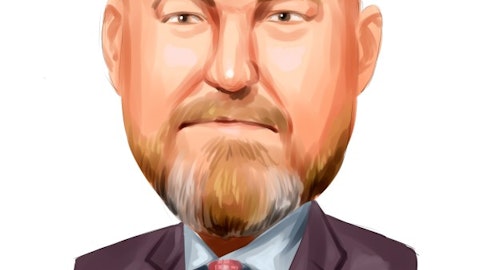Jeff Rulis: Tory, the inflation and market-related pressure impacting deposit levels, has that abated at all? I guess if we look at early in the second quarter to where we look at early now third quarter, I guess I am looking for 3-month look back, are we in a better spot? Obviously, we have tax season that’s not impacting us seasonally in the second half. But just want to – I know it’s a tough question to answer, but just in firmer footing in terms of that the inflation and market pressure items?
Tory Nixon: Yes. I think the best way for me to answer that is if I look at the – even the change in the average account balance quarter-over-quarter, it’s from $20,000 on the consumer side to $19,000 in $118 to $117 million. So you just – it’s just a natural flow of cash being used for business activities. Typically for us, the second half of the year, especially because of the ag portfolio, you start to see a run up in deposit balances. So my expectation is if I’m looking at the pipelines and thinking about kind of historical trends, we’ve got some nice momentum for deposit activity in the second half of the year.
Jeff Rulis: Okay, thank you. I’m sorry, one last, just a housekeeping. The outlook slide on the expenses for the $240 million to $250 million run rate. I can’t carve out – you guys kind of talking about opportunistically, you might have more cost synergies than you announced on the deal. Is that inclusive of those additional opportunities? Or are we looking at something lower than $240 million to $250 million and is that timing outside of this calendar year?
Ron Farnsworth: Hey, Jeff, this is Ron again. That number does not include the additional above the $135 million. We will talk more about that in the October call once we hit the $135 million outlook for the balance of Q4, we could see going into Q1.
Clint Stein: Jeff, this is Clint again. The one thing I would add to that is part of the reason we said early on that we had a higher internal target was the uncertainty around inflation. But also while the merger was pending, we expanded our footprint, and we’re in some new markets, and we’re going to invest in those markets. And so part of that is maybe a reallocation of that expense into expanding in certain parts of our footprint.
Jeff Rulis: Okay, appreciate it. Thank you.
Operator: Thank you. [Operator Instructions] Our next question comes from the line of Matthew Clark with Piper Sandler. Your line is open.
Matthew Clark: Good afternoon, everyone.
Clint Stein: Hi, Matt.
Matthew Clark: Maybe just on the loan sales, I think they were mentioned in your prepared remarks and in the slide deck, any sense for additional sales from here? And just trying to get a sense for whether or not there is deliberate loan sales still to come and flattish loan balances are kind of a reasonable forecast consistent with this quarter?
Tory Nixon: Hi. This is – It’s Tory again. I don’t really anticipate future loan sales at this point. I mean what we exited from we’re just really transactional participations in larger syndications that just wasn’t the right deployment of capital and liquidity from our perspective. So I think it was a good move for the company and right thing to do and really kind of it’s over and kind of it’s moving forward.
Matthew Clark: Okay. And then can you address a media report that came out just a couple of weeks ago on multifamily suggesting that Umpqua was getting out of that business? Just want to confirm whether or not that’s true or not?




